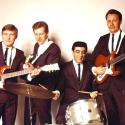“Ooooh, it’s gorgeous!” exclaimed my wife-to-be as we arrived at what had been described as “an oasis in Hertfordshire.” They weren’t kidding, either. The site for the inaugural festival organised by Notting Hill Carnival stalwarts Sancho Panza couldn’t have been more different from West London if it tried. In place of terraced houses there were wall-to-wall trees, the only flyover was the sound of planes headed for Luton across an open sky.
Now, full disclosure here, I’ve never been the biggest fan of Carnival. I’ve been unlucky I suspect, but if I want to re-create the magic of Bank Holiday August weekend, I’ll stay at home, invite 500 people to cram themselves into my sitting room, then pepper spray myself in the face. It saves on the train fare.
Even those for whom it has been a real cause for celebration have become disenfranchised of late, however. As police kettle crowds into ever decreasing circles, directing them to places where they can have the sort of fun that can be easily monitored, the congestion has become too much. For those who actively enjoy being marshaled through a cynically pre-ordained circuit without the ability to deviate, may I suggest IKEA?
Anyway, with the schoolyard on Middle Row that was Sancho Panza’s fixed abode for so many years now fallen victim to urban redevelopment, the organisers, Jim Angell and Matt Brown decided to spread their wings and create a family-friendly environment out in the countryside that seems to occupy a space somewhere between DIY rave and village fete. If that seems a baffling combination, it really isn’t when you’re there.

So, while 30,000 people at Camp Bestival, Rob Da Bank’s annual child-friendly festival went about their business in Lulworth Cove, showing how family fun can be had on a grand scale, 500 revellers at Campo Sancho demonstrated how important size is in defining an event and its ethos, and how the little guys can punch well above their weight…
The main site was spread over just one field, split into two by a small trench. The upper paddock housed the children’s entertainment, which included an art tent, where various workshops for the young and young-at-heart were held, including spoken word and music events. Next to this sat the Panic Circus (Professor Panic pictured below), which proved to be a weekend-long highlight, as our high-energy hosts laid on acrobat classes, a superb Punch and Judy show and general clowning around. The energy levels were impressive and infectious as the players pitched their performance perfectly to parents and kids simultaneously – meaning that there was often a figurative, as well as literal, tightrope act going on.

Just down from here was the Middle Row stage, an outdoor stage complete with Royal Borough of Kensington & Chelsea street sign as a nod to Sancho’s past Carnival capers. Then, just a few steps across a bespoke wooden bridge to the lower field, we found the Snare and Hi-Hat tent, open on two sides and home to both the bar and the serious, late-night partying.
With just two stages, and little or no overlap, attention was focused and there were no unruly sound clashes – in fact, the carefully chosen line-up of DJs, including Size Doesn’t Matter’s Si Kurrage and Mr Shiver, Ray Mang (the alias of disco dub Don Raj Gupta), and Reverso 68 (Pete Herbert and Phil Mison) seemed to compliment each other pretty much perfectly for the duration of the weekend.
This impressive cohesion of curation extended to the two live acts that graced the festival, both performing on the outdoor stage and both beneficiaries of the wonderful weather. You don’t need the sun to have a good festival, but by God it helps. Crazy P Soundsystem set up the Saturday with their infectious disco house hybrid that has served them – and us – well over the course of 15 years and 10 studio albums. Here, as with Faze Action’s feelgood, celebratory Sunday afternoon set (pictured below), there was an incredible sense of involvement. It's not quite true to say that the line between performers and audience disappeared, but it did, occasionally, seem gossamer thin, and at these times, it didn’t feel like we were attending a festival, it felt like we were the festival. This blurring of the artist/punter boundary is at the very core of club culture and remains the key difference between events like Campo and Alfresco, and the more traditional big-ticket draws. Numbers have a part to play, of course – intimacy heightens everything. Barriers tend to come down more quickly in smaller gatherings, and there’s nothing like bringing down barriers in the middle of a sunny field to bring out one’s inner cosmic hippie.

But there’s something else too. Something that happens when you get everything just so: the venue, the music, the crowd… all of a sudden, you unlock a real sense of community. A lot of people at Campo Sancho were clearly old friends, but many of us were not, yet open arms and broad grins were everywhere. In the future Campo Sancho will, inevitably, have to grow, but the organizers are canny. They know that, if you scale the numbers too far, such interaction becomes, if not impossible, then certainly much harder to achieve. It’s absolutely essential, however, if you want to fully realise the ultimate goal – a good, old-fashioned feelgood tribal dance. On this front, Campo Sancho excelled, with the help of a very flexible license that stretched until dawn, a spectacular sound system and the combined talents of Pete Herbert on Friday and The Revenge and Darren Roach on Saturday.
And as we danced, we did so amid attention to detail that was a continual delight: from the “£1 per pee” signs by the toilets (in case anyone was missing the full Notting Hill experience), to the wonderful whittled wooden chairs that surrounded the impressive fire pits, and the pure and plentiful provision of drinking water (not by any means a given for an event of this size). People were well taken care of, and the goodwill generated fed the atmosphere and powered the energy levels.
Back in London, money talks. It also strangles, alienates and prevents. Clubs and live music venues are being forced to close, to make way for more profitable ventures, green-lit under the banner of regeneration. Meanwhile those who dare to dream of owning a house are moving to the sticks as prices drift upwards into the realm of fantasy. Everything’s cheek-by-jowl, everything’s so close, eveything's so bloody ensuite. Both space and spaces are in short supply. Campo Sancho may have provided a welcome weekend escape to the country, but it also showed that, when your environment no longer suits, you need to change it.















Add comment